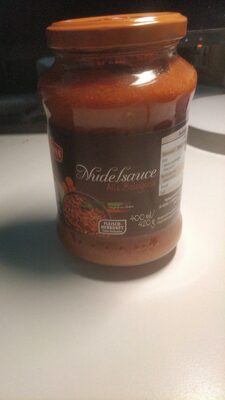
Barcode: 4061458028240
Pastasauce – Bolognese
DOUBTFUL
📝 Reason: The product contains Rindfleisch gegart (cooked beef) which is marked as Doubtful due to the absence of Halal certification. According to Islamic dietary laws, meat must be slaughtered in a Halal manner and certified to be considered Halal. Without certification, the status of the meat is uncertain.
📄 Certificates: None
Ingredients:
Details
Understanding the Halal Status of Pastasauce – Bolognese
When it comes to enjoying food, many consumers are increasingly conscious of what constitutes Halal. For those interested in the revered Italian dish, Pastasauce – Bolognese, the Halal status raises some questions. In this post, we delve deep into the ingredients and their Halal compliance, particularly spotlighting the cooked beef that forms the crux of this popular sauce.
Product Overview
Pastasauce – Bolognese combines a rich blend of tomatoes, vegetables, and beef to deliver a deeply savory experience. However, its Halal certification status has been marked as DOUBTFUL. This indicates that while certain ingredients are compliant with Halal standards, the key meat component lacks the necessary certification.
Why the Doubt?
The main ingredient causing concern in the Halal assessment of Pastasauce – Bolognese is Rindfleisch gegart (cooked beef). According to Islamic dietary laws, meat needs to be prepared and slaughtered in a Halal manner and must be accompanied by appropriate certification. As the package lacks any such certification, the beef’s Halal status is uncertain, leading to its doubtful classification.
The Ingredients Breakdown
- Tomatenfruchtfleisch: A plant-based ingredient, generally considered Halal.
- Rindfleisch gegart: The cooked beef in this sauce is marked as doubtful due to missing Halal certification.
- Karotten: Purely plant-based and compliant with Halal.
- Zwiebel: Another plant-derived ingredient that is Halal friendly.
- Zucker: Sourced from plants, it is also deemed Halal.
- modifizierte Stärke: This modified starch is plant-based and thus considered Halal.
- Speisesalz: A mineral-based ingredient, it fits within Halal standards.
- Sonnenblumenöl: A plant-based oil that is generally regarded as Halal.
- Milchsäure (E270): Usually derived from plant sources, it is considered Halal as well.
- pflanzliches Eiweißhydrolysat: This is a plant-derived protein, again Halal compliant.
- Röstzwiebelpulver: Made from onions, this ingredient is Halal.
- Knoblauchgranulat: As a plant, garlic is Halal-friendly.
- Rosmarin: A herb that complies with Halal standards.
- Oregano: Another herb that is also Halal.
- Thymian: Compliant herb under Halal requirements.
- schwarzer Pfeffer: A spice that meets Halal criteria.
- Maiskeimöl: A plant-based oil considered Halal.
Conclusion
While many ingredients in Pastasauce – Bolognese pass Halal scrutiny, the absence of Halal certification for the cooked beef renders the product’s status as ‘Doubtful’. For consumers looking for true Halal options, it is advisable to seek alternative sauces that carry reputable Halal certification. This dive into ingredients shows the importance of transparency and awareness in food choices, especially for those adhering to dietary laws.
Final Thoughts
In conclusion, while the majority of the components in the Bolognese sauce are compliant with Halal guidelines, the key ingredient of cooked beef leaves uncertainty. It’s always best practice to verify Halal certifications before purchasing and consuming products to ensure alignment with dietary restrictions.

